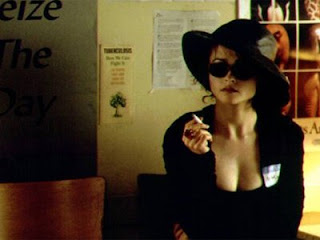The main story follows Tom, a 17-or-so boy at an all-boy's boarding school who is teased for his lack of traditional masculinity. Now, here's the thing: instead of enjoying football and goosing the cute waitress Ellie, he plays acoustic guitar, sings beautifully, writes poetry, wears sweaters and goes on long walks. Oh, and here's the clincher: he dreams of being a professional folk singer. Does that not sound like the sort of guy who'd be marketed as adorable and "a catch" these days? Just take a look at some more recent movie hearthrobs. Tom Hansen (Joseph Gordon-Levitt) from (500) Days of Summer, Paulie Bleeker (Michael Cera) from Juno, Andrew Largeman (Zach Braff) from Garden State, the list goes on. Anyway, Tea and Sympathy is beyond fascinating with that comparison in mind. The guys who push Tom around seem less like "the norm" and more like the jerky meatheads who would end up being the butt of every joke in a modern romantic comedy.
(By the way, Tea and Sympathy is by no means a romantic comedy or in any way comparable to the studiotastic indie romances I mentioned up there- my comparison begins and ends with the portrayal of normal/desirable masculinity.)












